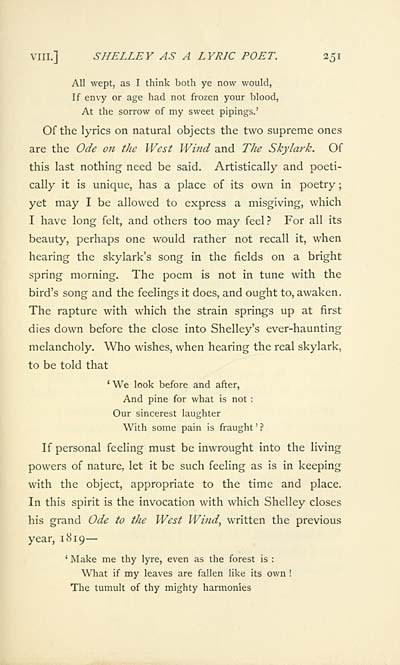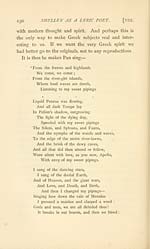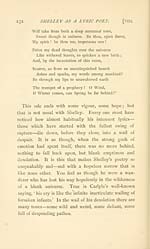Ossian Collection > Aspects of poetry
(267)
Download files
Complete book:
Individual page:
Thumbnail gallery: Grid view | List view

VIII.] SHELLEY AS A LYRIC POET. 251
All wept, as I think both ye now would,
If envy or age had not frozen your blood,
At the sorrow of my sweet pipings.'
Of the lyrics on natural objects the two supreme ones
are the Ode on the West Wind and The Skylark. Of
this last nothing need be said. Artistically and poeti-
cally it is unique, has a place of its own in poetry ;
yet may I be allowed to express a misgiving, which
I have long felt, and others too may feel? For all its
beauty, perhaps one would rather not recall it, when
hearing the skylark's song in the fields on a bright
spring morning. The poem is not in tune with the
bird's song and the feelings it does, and ought to, awaken.
The rapture with which the strain springs up at first
dies down before the close into Shelley's ever-haunting
melancholy. Who wishes, when hearing the real skylark,
to be told that
' We look before and after,
And pine for what is not :
Our sincerest laughter
With some pain is fraught ' ?
If personal feeling must be inwrought into the living
powers of nature, let it be such feeling as is in keeping
with the object, appropriate to the time and place.
In this spirit is the invocation with which Shelley closes
his grand Ode to the West Wind, written the previous
year, 1819—
' Make me thy lyre, even as the forest is :
What if my leaves are fallen like its own !
The tumult of thy mighty harmonies
All wept, as I think both ye now would,
If envy or age had not frozen your blood,
At the sorrow of my sweet pipings.'
Of the lyrics on natural objects the two supreme ones
are the Ode on the West Wind and The Skylark. Of
this last nothing need be said. Artistically and poeti-
cally it is unique, has a place of its own in poetry ;
yet may I be allowed to express a misgiving, which
I have long felt, and others too may feel? For all its
beauty, perhaps one would rather not recall it, when
hearing the skylark's song in the fields on a bright
spring morning. The poem is not in tune with the
bird's song and the feelings it does, and ought to, awaken.
The rapture with which the strain springs up at first
dies down before the close into Shelley's ever-haunting
melancholy. Who wishes, when hearing the real skylark,
to be told that
' We look before and after,
And pine for what is not :
Our sincerest laughter
With some pain is fraught ' ?
If personal feeling must be inwrought into the living
powers of nature, let it be such feeling as is in keeping
with the object, appropriate to the time and place.
In this spirit is the invocation with which Shelley closes
his grand Ode to the West Wind, written the previous
year, 1819—
' Make me thy lyre, even as the forest is :
What if my leaves are fallen like its own !
The tumult of thy mighty harmonies
Set display mode to: Large image | Transcription
Images and transcriptions on this page, including medium image downloads, may be used under the Creative Commons Attribution 4.0 International Licence unless otherwise stated. ![]()
| Early Gaelic Book Collections > Ossian Collection > Aspects of poetry > (267) |
|---|
| Permanent URL | https://digital.nls.uk/78388476 |
|---|
| Description | Selected books from the Ossian Collection of 327 volumes, originally assembled by J. Norman Methven of Perth. Different editions and translations of James MacPherson's epic poem 'Ossian', some with a map of the 'Kingdom of Connor'. Also secondary material relating to Ossianic poetry and the Ossian controversy. |
|---|
| Description | Selected items from five 'Special and Named Printed Collections'. Includes books in Gaelic and other Celtic languages, works about the Gaels, their languages, literature, culture and history. |
|---|

